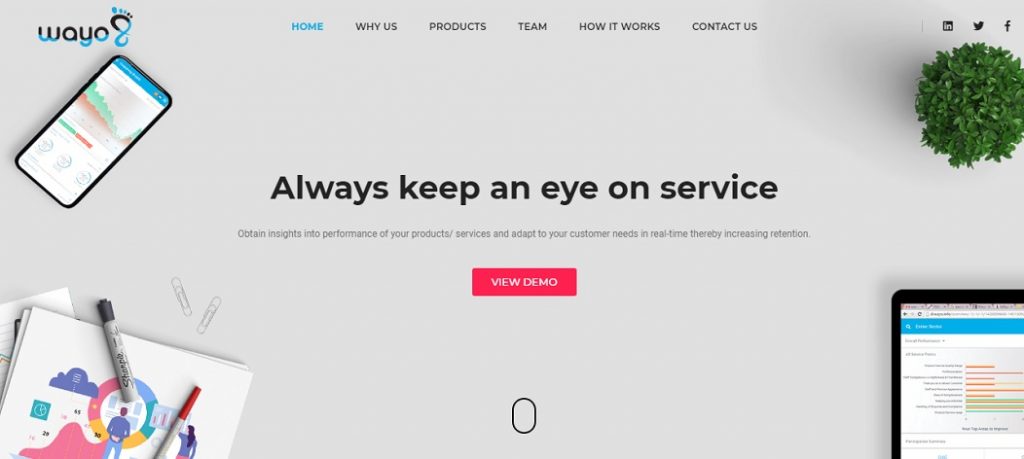Kenyan startup WAYO, an AI-powered customer experience management platform that collects, monitors, and evaluates in real-time, is helping retail companies predict demand for their products, and plans to scale into Nigeria shortly.
Founded in 2015, WAYO allows retail organisations with large customer bases to obtain insights into the performance of their products and services, and accurately predict demand across all their touchpoints promptly.
This in turn allows them to derive action points and adapt to customer needs when it matters the most, thereby increasing retention and brand equity. Founder Ernest Makotsi told Disrupt Africa that the WAYO platform has three main use cases.
“First, we allow retailers to evaluate their service in real time. Customers can easily give you feedback at the point of service. Collect and analyse customer experiences across all service points to respond and resolve customer issues quickly, effectively and accurately,” he said.
Secondly, it cuts down on customer wait times.
“Our mobile-integrated queue management solution helps organizations minimise wait times and accurately predict demand which improves customer flow. We achieve this by allowing customers to join a queue before getting to the branch and monitor progress through SMS or instant messaging apps such as Telegram on their mobile phones. In these challenging times of the COVID-19 pandemic, organisations can use this solution to avoid overcrowding and ensure social distancing,” Makotsi said.
Finally, WAYO makes customer support simple, with its mobile-integrated help desk allowing retailers to solve customer-related questions quickly and simply, thanks to an AI chatbot feature.
All vitally important services for a retailer, but WAYO has its roots in a personal tragedy for Makotsi.
“In 2008, my father had to be admitted to hospital, and the experience we went through as a family wasn’t pleasant, as it was impossible to communicate with the person in charge at the hospital,” he said.
“My father, unfortunately, did not make it out of hospital, and I found myself wishing the hospital had a well-structured communication network between its patients, their loved ones and the people in charge. A real-time feedback loop would have probably improved our experience, I believed, as we left with many unanswered questions.”
At the time, given the circumstances, he did not dwell too much on the idea, but six years later he was talking to a cousin employed at a commercial bank.
“To my amazement she talked a lot about the challenges they had in collecting actionable data when it comes to customer feedback, and was suggesting I create a solution as she was looking at some of the work I had done in the technical space,” Makotsi said.
“That’s when it dawned on me that it was a business idea, and at the same time I was given an opportunity to present a business idea to a number of investors at the KICC.”
During this event Makotsi met Johnni Kjelsgaard, chief executive officer (CEO) of the Nairobi-based GrowthAfrica incubator, and ended up taking part in its Idea to Innovation programme.
“During the programme I developed a prototype, and I received some seed funding to pilot the project. After a successful pilot with one of the leading hospitals in Kenya, we got a proof of concept, and we signed a partnership deal with The Grass Company, a research agency in Kenya, which invested additional money to scale the product to multiple clients,” said Makotsi.
Since then, progress has been very encouraging.
“We have worked with Bill & Melinda Gates Foundation as part of the Grand Challenges exploration, where we developed a low cost and reliable technological solution to capture relevant data relating to the delivery and use of digital financial services in developing countries,” said Makotsi.
“We have also worked with Mater Hospital providing real-time customer feedback, among other organisations in the banking and telecommunication sectors.”
Such is WAYO’s success in Kenya, it is already planning expansion, and the startup is working with a number of potential partners to survey and test the market ahead of a launch in Nigeria towards the end of next year. Makotski believes WAYO, which monetises via monthly usage fees but is still investing heavily in product development, is filling a vital gap for all types of organisations, starting with retailers.
“Organisations rely on data to make critical decisions, and data related to the delivery and use of their products and services is critical to unlocking key barriers to their widespread adoption, which is critical to scaling businesses,” he said.
“But at the same time, data collection techniques and methodologies are often expensive, error-prone, slow, low resolution, and unsustainable, providing only a snapshot of “today”. Therefore a lot of businesses end up with data they cannot act on. This is the main challenge WAYO is addressing. With a focus on customer experience we seek to provide decision support tools that will help businesses turn data into action.”


